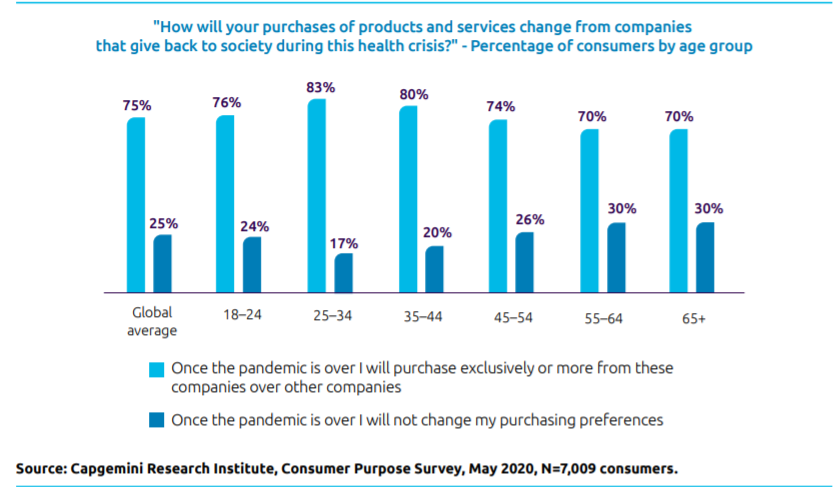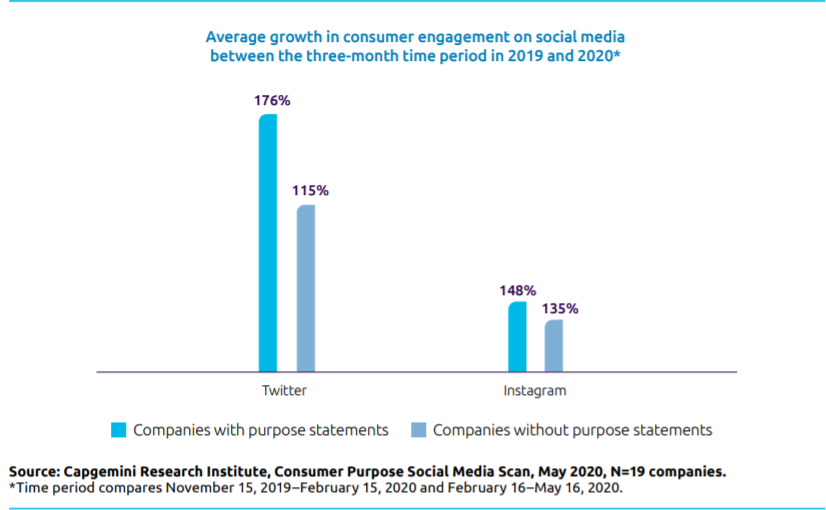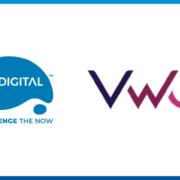Why purpose-led organizations are winning consumer’s hearts

This pandemic age will be remembered as the time that purposeled organizations really turned purpose “statements” into impactful, meaningful, and life-changing actions.
This is a critical time where corporate purpose must be translated into action. A higher purpose is not merely about economic exchanges but reflects something more aspirational. Today, companies are under intense scrutiny regarding how they respond to the pandemic, and the world expects them to act with empathy and purpose and have a real and positive impact on the world. Not only do purpose-led organizations play a critical role in supporting relief efforts and driving economic and humanitarian recovery, but also in supporting social justice movements. For example, the current situation brings more attention to the need to be purposeful. Many organizations across the world expressed their solidarity with the black community to fight injustice and racism Purpose-driven organizations are focused on multiple stakeholders, from employees to communities.

Capgemini Research Institute wanted to understand the consumer perspective in particular, especially because there is a real business risk of losing customers if organizations do not positively contribute. How exactly is purpose viewed by consumers in the current crisis? Do consumers expect organizations to contribute to COVID-19 relief efforts and will they reward organizations that do? Does a positive contribution to today’s crisis lead to increased engagement and loyalty?
To answer these questions, Capgemini Research Institute surveyed consumers across seven countries – France, Germany, India, Italy, Spain, the United Kingdom, and the United States – at the end of May. It also analyzed social media engagement for over 1.5 million conversations for a sample of 19 companies that made notable positive contributions to COVID-19 relief efforts over the course of March, April, and early May.
The research explores the following key findings:
1. Consumers have high expectations of what it means to be purpose-led
Consumers increasingly want to hold companies accountable for doing the right thing, from taking a stand on climate change to driving workforce diversity. There is a growing expectation of companies to remain true to a clear set of beliefs and values. And we have found that intense consumer attention on purpose is not specific to today’s crisis – it’s a tendency that will remain true for the longer term.Consumers believe organizations can do more for humanity as a whole In 2019, the Business Roundtable, a US-based membership association, released a declaration in which 181 CEOs committed to lead their companies for the benefit of multiple stakeholders – customers, employees, suppliers, communities,and shareholders.
This consensus on the importance of purpose has never been more front and center than during today’s crisis. Satya Nadella, CEO of Microsoft, said in March,
“It is in times of great disruption and uncertainty that our ability to stay grounded in our sense of purpose and remain true to our identity is of the utmost importance.” The research suggests that consumers not only want companies to embody a sense of purpose, they actually think that companies could be doing more for society

2. Consumers will reward organizations that contribute during this health crisis
Consumers will financially reward companies that make a difference. Consumers around the world are willing to financially reward companies that are giving back to society during this crisis. Asthe CEO of Unilever, Alan Jope recently said in an interview, “I think if you frame the recovery as economy vs health, it’s a false framing. We’ve got to manage a return to health and a return to economic activity. In the same way, we shouldn’t talk about purpose over profits. We truly believe that by positioning
our brands on doing real good, by running our supply chain in a sustainable way, by being a responsible employer and creating great opportunities for people, a byproduct will be better financial performance.” Once the pandemic is over, three-quarters (75%) will either purchase exclusively from these companies or buy more from them

3. Consistency in how companies live their purpose is critical
Organizations should be careful to not reduce purpose to a marketing tactic or a quick campaign. Rather, it should be something that is deeply embedded into business process, brand identity, and the experience companies deliver. Purpose creates relationships with consumers that go far beyond transactional or product-based relationships.32 Thus, consistency of messaging and actions around purpose is
critical. Our research revealed that organizations that are consistent in their purpose-related actions stand to gain increased consumer engagement.
Companies that deliver on their purpose consistently see greater consumer engagement

The Key India findings from the research note:
· 79% of Indian consumers agree that companies have a larger role to play in society than just looking after their self-interests compared to global average of 78% of Consumer
· 81 % of Indian consumer agree that private organizations can do more than they are currently doing to help society and humanity at large compared to 74% of global consumers, 66% of consumers in United States Of America, 73% of Consumers in United Kingdom
· 79% of Indian consumers believe that this health crisis made them realize that governments need the help of private organizations to resolve societal issues compared to 69% of global consumers
· 79% of Indian consumers expect private organizations to give back to society when there is a major crisis such as the current pandemic compared to 69% of global consumers
· 74% of Indian consumers believe that companies primary responsibility is taking care of its employees during pandemic compared to 86% of consumers globally
· 64% of Indian consumers believe that companies should find creative ways of repurposing their own expertise (e.g., offering existing or creating new technology solutions) while giving back compared to 54% of global consumers
· 66% of Indian consumers believe that company should monetarily contribute compared to 44% of global consumers
· 90 % of Indian consumers will purchase products and services from companies that give back to society during this health crisis compared to 75% of global consumers
· Once the pandemic is over 10% of Indian consumers will not change purchasing preferences compared to 25% of global consumers
· 82% of Indian consumers feel a sense of gratitude for companies that give back to society during this health crisis compared to 75% of global consumers
· 82% of Indian consumers feel a sense of trust for companies that give back to society during this health crisis compared to 73% of global consumers
· 84% of Indian consumers feel a sense of pride for companies that give back to society during this health crisis compared to 72% of global consumers
· 84% of Indian consumer feel a sense of loyalty for companies that give back to society during this health crisis compared to 69% of global consumers
Being purposeful and playing a wider role in society is increasingly important to consumers and, this research reveals, even more so in the current crisis. Consumers
value honesty, integrity, and authenticity in organizations’ responses. And they will reward organizations with their loyalty and with their purchases for those that give back to society. In times of uncertainty, people often turn to those they know and trust and feel close to heart. With purpose, organizations can address these sentiments and move to that coveted, position which brings great responsibility.














